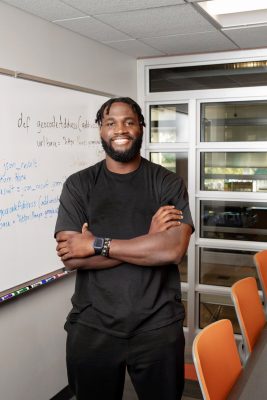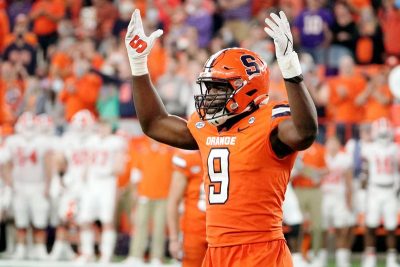 When Syracuse Orange defensive end Kingsley Jonathan ’20, G’22 crushed Florida State quarterback Jordan Travis earlier this season, he did more than notch the game’s first sack. Jonathan experienced a homecoming of sorts. Three years earlier almost to the day, he famously brought down Travis’ predecessor, Deondre Francois, amid the sweltering heat of the Syracuse University stadium. “It was one of the first sacks of my college career and certainly the most memorable,” says the fifth-year senior. “I love the adrenaline rush that comes from tackling people.”
When Syracuse Orange defensive end Kingsley Jonathan ’20, G’22 crushed Florida State quarterback Jordan Travis earlier this season, he did more than notch the game’s first sack. Jonathan experienced a homecoming of sorts. Three years earlier almost to the day, he famously brought down Travis’ predecessor, Deondre Francois, amid the sweltering heat of the Syracuse University stadium. “It was one of the first sacks of my college career and certainly the most memorable,” says the fifth-year senior. “I love the adrenaline rush that comes from tackling people.”
Since then, the 6-foot-4-inch, 260-pounder has ascended to ACC elite—a feat underscored by his receipt of the 2020 Jim Tatum Award for being the league’s top football student-athlete. “To be honest, I didn’t think I was going to win the award,” recalls the Nigerian native, who has racked up more than 80 tackles and 10 sacks throughout his college career. “I’m blessed to use my position to be a role model for others.”
For all his size, power and first-step quickness, Jonathan is what some pundits call a “thinking player.” Careful. Deliberate. Able to take in the entire field while scanning the line of scrimmage. Such moxie has earned him praise from fans and teammates alike. Football head coach Dino Babers compares Jonathan to a high-performance engine. “Kingsley is an outstanding leader for his generation,” Babers says. “He is a great representative for Syracuse University and our program in the classroom, throughout the community and on the football field.”
When not anchoring one of the ACC’s most veteran-laden defensive lines, Jonathan holds court in the School of Education. Credit the COVID-19 pandemic for giving him an extra year of NCAA eligibility—and the chance to pursue a master’s degree in instructional design, development and evaluation. Encamped in historic Huntington Hall, he explores instructional solutions for various learning and performance problems. Mostly the stuff of business, industry and education, Jonathan explains. “Everybody wants to do things more efficiently and effectively. Instructional design models can optimize behavioral performance.”
While Jonathan is still sorting out his career options (including a shot at the NFL), he hopes to someday create computer systems that protect against cyberattacks. “I like showing people how to keep their software and systems safe,” says the star pass rusher, who graduated magna cum laude from the School of Information Studies (iSchool) with a bachelor’s degree in information management and technology. “Cybersecurity is a big issue in the digital age.”
 The son of an electrical engineer, Jonathan came to Syracuse thinking he’d follow in his father’s footsteps. But a prophetic meeting with iSchool professor Jeff Rubin ’95, G’98 convinced him otherwise. “We discussed how information systems organize data and how security measures are needed to protect this data,” Jonathan explains. And then he had an epiphany: “After talking with Professor Rubin, I realized that I didn’t just want to design instructional materials; I also wanted to implement and evaluate them for the greater good.” The iSchool’s state-of-the-art facilities, combined with a decades-long commitment to creativity and academics, clinched his decision to commit.
The son of an electrical engineer, Jonathan came to Syracuse thinking he’d follow in his father’s footsteps. But a prophetic meeting with iSchool professor Jeff Rubin ’95, G’98 convinced him otherwise. “We discussed how information systems organize data and how security measures are needed to protect this data,” Jonathan explains. And then he had an epiphany: “After talking with Professor Rubin, I realized that I didn’t just want to design instructional materials; I also wanted to implement and evaluate them for the greater good.” The iSchool’s state-of-the-art facilities, combined with a decades-long commitment to creativity and academics, clinched his decision to commit.
Jonathan became a force in the classroom, earning all manner of honors and awards. All-ACC Academic Team. ACC Honor Roll. Athletic Director’s Honor Roll. “He is a model student-athlete,” Babers declares. A summer internship with the University’s information technology service center reaffirmed Jonathan’s desire to help others. Providing hands-on tech support for fellow students, he discovered that when it came to creative problem-solving, two people were better than one. “The other interns taught me a lot,” admits Jonathan, a two-time semifinalist for the William V. Campbell Trophy, also known as the Academic Heisman. “The iSchool set the stage for what I’m doing today in graduate school—and hope to do in life.”
Writing a New Playbook
Raised in the sprawling port city of Lagos, Jonathan had a proclivity for soccer and basketball that revealed a strong competitive streak. It didn’t hurt that he towered above most other kids his age. “I’ve been big all my life,” says Jonathan, whose given name, Chukwuemeka, means “God has done it.” “What works for me, athletically speaking, may not work for others.”
Jonathan was 15 when he migrated to North Carolina in search of more opportunities. Leaving behind his family (including a brother and two sisters), he attended high school near Raleigh, earning a spot on the varsity football team. “I watched a lot of YouTube videos in an attempt to learn the game,” says Jonathan, who, as a ninth grader, had never stepped onto a football field before. Extenuating circumstances forced him to relocate to Baltimore during his senior year, and by then football was second nature to him.
 Nearly a dozen programs courted Jonathan before he joined Babers’ first full recruiting class in 2017. Almost overnight, the three-star recruit became one of the team’s secret weapons—a perennial starter whose knack for posting tackles, breaking up passes and forcing turnovers has helped dictate Babers’ versatile 3-3-5 defense. In a recent matchup against Boston College, the Orange didn’t surrender a touchdown for the second time this season, thanks in part to Jonathan’s career-high three sacks. “I want to come out of Syracuse a better player and a better man,” says Jonathan.
Nearly a dozen programs courted Jonathan before he joined Babers’ first full recruiting class in 2017. Almost overnight, the three-star recruit became one of the team’s secret weapons—a perennial starter whose knack for posting tackles, breaking up passes and forcing turnovers has helped dictate Babers’ versatile 3-3-5 defense. In a recent matchup against Boston College, the Orange didn’t surrender a touchdown for the second time this season, thanks in part to Jonathan’s career-high three sacks. “I want to come out of Syracuse a better player and a better man,” says Jonathan.
Embracing Empathy
Over the course of his football journey, Jonathan has evolved into a consummate student—and advocate—of the game. A member of the University’s Student-Athlete Advisory Committee (SAAC), he also has served as an ACC representative to the Division I Council, where he has helped formulate the NCAA’s new interim name, image and likeness policy.
Jonathan is a guiding presence in the City of Syracuse, too—whether volunteering for the local Boys & Girls Club, raising money for the Upstate Golisano Children’s Hospital or establishing a SAAC hoodie drive to help the homeless.
He is especially proud of his association with the New York State Mentoring Program, working one-on-one with students at Syracuse’s Dr. Weeks Elementary School. Created in 1984 to help prevent school dropout, the statewide program took on a sense of urgency after the murder of George Floyd. “Many inner-city kids deal with personal, social and economic challenges. They also come from homes where there’s no positive role model,” says Jonathan, who spends an hour a week talking about the X’s and O’s of life with third through fifth graders. “I have so much I want to share with them.”
When asked to elaborate on this last point, Jonathan pauses for a moment and then strokes his copious beard. “Empathy,” he says, flashing his trademark smile. “If a kid is having a conversation with someone that escalates, I advise them to slow down and put themselves in the other person’s shoes. Empathy can teach us a lot about others and ourselves. It can take us a long way.”
Written by Rob Enslin
